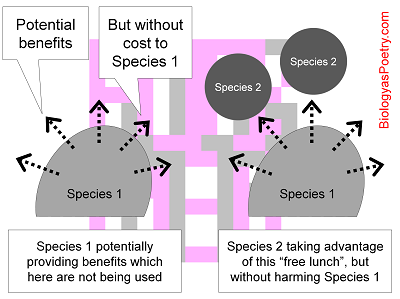∞ generated and posted on 2016.03.03 ∞
Interspecific interaction in which one organism gains whereas the other organism neither gains nor loses.
One can describe this as a plus-zero (+ 0) interaction. Commensalisms include numerous situations in which one organism, the commensal, lives either on or in another organism (typically, the host) without doing that other organism harm (but also not providing that other organisms with obvious benefits). Though simple in concept, in practice it can be difficult to tell whether the commensal organisms truly is not harming nor benefiting the second organisms.

Figure legend: Benefits such as resources, shelter, protection, locomotion are provided essentially for free by one organism (here Species 1) in the normal course of its existence. These benefits can be harnessed by other organisms, here Species 2, taking advantage of them without causing harm to Species 1 in the process. A large number of such interspecific interactions exist in addition to various symbioses, e.g., generally organisms that consume or otherwise make use of the dead, discarded aspects of other organisms – feces come to mind – are exhibiting such plus-zero interactions. Alternatively, commensalisms are not quite as trivially achieved when both of the interacting organisms are alive.
By far the majority of symbiotic interactions are probably commensalisms, rather than parasitic or mutualistic interactions. Non-symbiotic interactions, on the other hand, if nevertheless somewhat intimate can be often zero-zero, plus-minus, or plus-plus, that is, where neither party gains or loses, exploiter-victim interactions, or mutualisms, respectively. It thus is an open question the degree to which commensalisms dominate interspecific interactions in the non-microbial world.